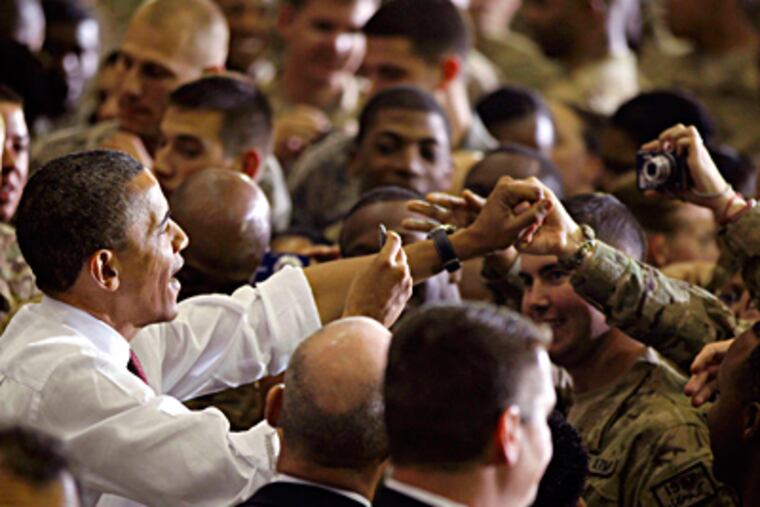Obama: A new Afghan day
On the anniversary of bin Laden's death, he made a surprise trip to the war zone.

BAGRAM AIR FIELD, Afghanistan - On a swift, secretive trip to the war zone, President Obama declared Tuesday night that after years of sacrifice, the U.S. combat role in Afghanistan is winding down just as it has already ended in Iraq. "We can see the light of a new day," he said on the anniversary of Osama bin Laden's death and in the midst of his own reelection campaign.
"Our goal is to destroy al-Qaeda, and we are on a path to do exactly that," Obama said in an unusual speech to America broadcast from an air base halfway around the world.
He spoke after signing an agreement with Afghan President Hamid Karzai to cover the decade after the planned final withdrawal of U.S. combat troops in 2014. Obama said American forces would be involved in counterterrorism and training of the Afghan military, "but we will not build permanent bases in this country, nor will we be patrolling its cities and mountains."
The president landed in Bagram in darkness, and his helicopter roared to Kabul for the meeting with Karzai, under close guard with only the outlines of the nearby mountains visible. Later, back at the base, he was surrounded by U.S. troops, shaking every hand. He ended his lightning visit with the speech delivered straight to the television camera - and the voters he was trying to reach back home.
Two armored troop carriers served as a backdrop, rather than the customary Oval Office tableau.
At the air base, Obama said: "This time of war began in Afghanistan, and this is where it will end. . . . With faith in each other, and our eyes fixed on the future, let us finish the work at hand and forge a just and lasting peace."
Earlier, he delivered a similarly upbeat message to the troops. Noting their sacrifice, he said: "There's a light on the horizon."
It was Obama's fourth trip to Afghanistan, his third as commander in chief. In all, he was on the ground for less than seven hours. He also visited troops at a hospital at the Bagram base, awarding 10 Purple Hearts.
According to the Pentagon, more than 1,800 American troops have been killed across more than a decade of war in Afghanistan.
Some 88,000 remain stationed there.
The wars in Afghanistan and Iraq combined have cost almost $1.3 trillion. And recent polls show that up to 60 percent of Americans oppose the continued U.S. presence in Afghanistan.
In his speech to the nation, Obama said: "I recognize many Americans are tired of war."
He said that last year, "we removed 10,000 U.S. troops from Afghanistan. Another 23,000 will leave by the end of the summer. After that, reductions will continue at a steady pace, with more of our troops coming home. And as our coalition agreed, by the end of 2014 the Afghans will be fully responsible for the security of their country."
He spoke for less than 15 minutes, beginning at 4 a.m. in Afghanistan, 7:30 p.m. in Philadelphia. Minutes later, Air Force One was on its way back to Washington.
The deal signed with Karzai does not commit the United States to any specific troop presence or spending. But, after the war ends, it does allow the United States to potentially keep troops in Afghanistan for two specific purposes: continued training of Afghan forces and targeted operations against al-Qaeda.
Obama said the agreement was meant in part to pay tribute to the U.S. troops who have died in Afghanistan. He also underlined his message to Afghans.
"With this agreement I am confident that the Afghan people will understand that the United States will stand by them," he said.
Karzai said his countrymen "will never forget" the help of U.S. forces over the last decade. He said the partnership agreement showed the United States and Afghanistan would continue to fight terrorism together. The United States promises to seek money from Congress every year to support Afghanistan.
To the troops, he readily conceded continued hardship.
"I know the battle's not yet over," he said. "Some of your buddies are going to get injured. And some of your buddies may get killed. And there's going to be heartbreak and pain and difficulty ahead."
He added that his administration was committed to ensuring that once the war is over, veterans would be given their due.
Officials have previously said as many as 20,000 U.S. troops may remain after the combat mission ends, but that still must be negotiated.
The president's Tuesday night address was coming exactly one year after special forces, on his order, began the raid that led to the killing of bin Laden in Pakistan.
Since then, ties between the United States and Afghanistan have been tested anew by the inadvertent burning of Muslim holy books at a U.S. base and the massacre of 17 civilians, including children, allegedly by an American soldier.
Obama had gone twice before to Afghanistan as president, most recently in December 2010, and once to Iraq in 2009. All such trips, no matter how carefully planned, carry the weight and the risks of considerable security challenges. Just last month, the Taliban began near-simultaneous assaults on embassies, government buildings, and NATO bases in Kabul.
Besides the U.S. troops in Afghanistan, there are 40,000 members of coalition forces from other nations.